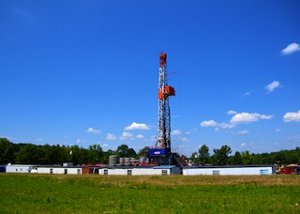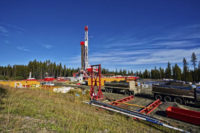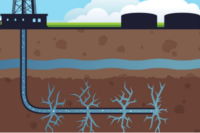 Posted with permission from WyoFile.com:
Posted with permission from WyoFile.com:
Last week Wyoming’s petroleum industry helped kill draft legislation that would give greater power to landowners to challenge Wyoming’s trade secret exemption in the disclosure of chemicals used in hydraulic fracturing, or fracking.
Senate File 157 also mandated that oil and natural gas operators conduct baseline testing of groundwater aquifers prior to drilling and fracking, a requirement aimed at having the data necessary to hold operators liable for potential spills and water contamination. During his tenure, Wyoming’s former oil and gas supervisor Tom Doll said he had strongly encouraged oil and gas operators to conduct baseline testing, in part, because it could also potentially exonerate companies if a question of groundwater and drinking water contamination ever arose. But it was never made a requirement.
Although SF 157 is dead, Wyoming will revisit both major goals of the legislation — higher bar for the trade secret exemption, and required baseline testing — through other avenues in coming months.
First, a Casper district court judge is expected to rule within 60 days on a lawsuit challenging Wyoming’s trade secret exemption in the disclosure of fracking chemicals. If the environmental and landowner advocacy groups that brought suit win, it will likely raise the bar for trade secret exemptions and possibly mandate disclosure to interested parties, particularly landowners near drilling and fracking operations.
Advocates for full chemical disclosure say the outcome of that court decision might not be as thorough as proposed under SF 157. It’s believed that Wyoming’s executive branch isn’t itching to intervene if the judge rules in favor of more disclosure. “We don’t know what it would look like if we lost. If we do (lose), we will change our practice,” said Jerimiah Rieman, policy advisor to Gov. Matt Mead.
“If it’s secret, then don’t use it. If you’re using it, be ready to disclose it,” Richard Garrett, energy and legislative advocate with the Wyoming Outdoor Council, said of fracking chemicals. “It’s in everybody’s interest; our economy depends on it, our jobs depend on it, our groundwater depends on it, and future generations do, too.”
In 2010, Wyoming became the first state in the nation to require disclosure of fracking chemicals. Promulgated through rule-making by the Wyoming Oil and Gas Conservation Commission, the mandate includes a trade secret exemption which landowner advocates say is granted too often, unnecessarily avoiding the true nature of the rulemaking; full disclosure to interested parties.
Baseline testing
With regard to SF 157’s mandate of baseline groundwater testing, the matter will be pursued by either the Wyoming Department of Environmental Quality (DEQ) or the Wyoming Oil and Gas Conservation Commission in rule-making rather in statute by the legislature, according to those close to the issue. Wyoming DEQ might be the avenue since that agency deals in water quality. However, if the state doesn’t address baseline groundwater testing through rule-making in the interim, it’s believed that a bill will again come before lawmakers during next year’s legislative session.
Petroleum industry officials said their main objection to SF 157’s baseline testing requirement is that it would have necessarily required drilling new water testing and monitoring wells, rather than simply test existing water wells in proximity to drilling operations. That, said Bruce Hinchey, president of the Petroleum Association of Wyoming, is an unreasonable, added expense.
“As proposed, we are opposed. We don’t think it’s necessary and it’s very costly.”
Some proponents of groundwater testing as proposed in SF 157 said they are encouraged that the governor’s office and Wyoming lawmakers have given solid support to funding the monitoring and clean-up of leaky landfills across the state in recent years, and said they hoped that state leaders eventually will view baseline testing in the oil and gas industry similarly.
In debate about continued appropriations toward addressing landfill pollution, House Speaker Rep. Tom Lubnau (R-Gillette) said, “If it (landfill pollution) gets into our water that’s the worst legacy we can leave.”
Richard Garrett said, “Oil and gas is much bigger deal (than leaky landfills), covering 40 percent of our landscape.”
Click here for more of WyoFile’s ongoing Legislature 2013 coverage.



